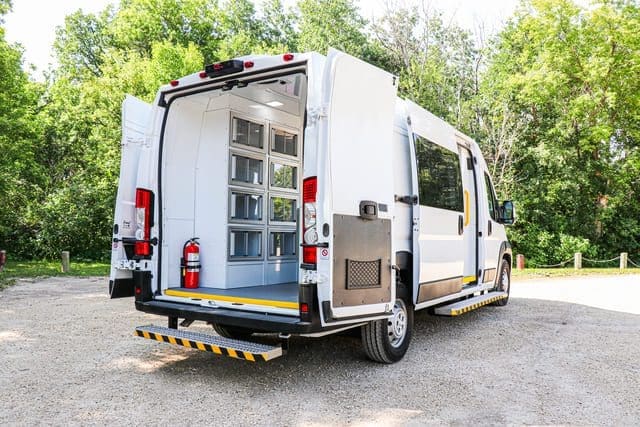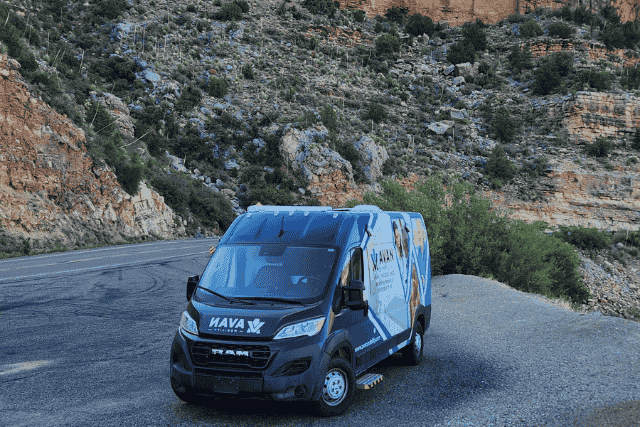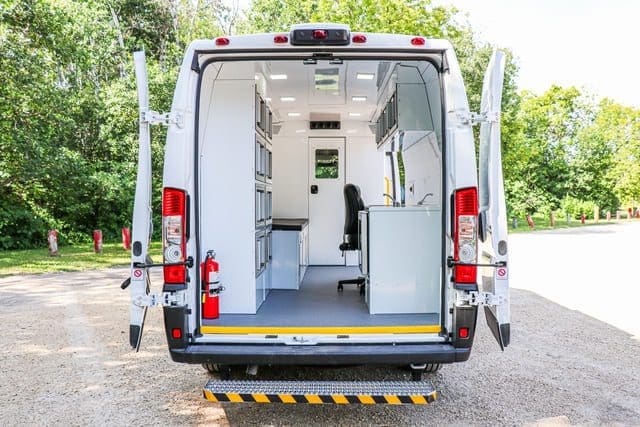Not many people get excited about weighing medical equipment. But here’s the thing: The weight of your equipment affects everything. It impacts how your mobile clinic handles on the road, how much fuel it burns, and how well it holds up over time. If you don’t plan for it, you could run into unexpected costs, maintenance issues, or a setup that doesn’t function the way you need it to.
And that’s frustrating. You’re focused on delivering care, not calculating weight limits. But getting this right means a smoother, more reliable mobile health clinic that works exactly how you expect, without surprises down the road.
For over 10 years, we’ve built mobile medical clinics that help organizations like yours and CalOptima bring healthcare where it’s needed. Our vehicles meet Ford QVM and Stellantis QPro certifications, meaning they’re built to last. We’ve worked with teams across the U.S. to create clinics that run efficiently, and we know how to design a setup that works.
We’ll break down the weights of:
- A mobile medical clinic itself
- The generator
- A flip table
- The sink/water system
- AMF seats
By the end, you’ll know what to expect and how to build a mobile health clinic that stays safe, efficient, and easy to manage. Keep in mind that the weights in this article are estimates and reflect the objects in the Mobile Clinic Van.
How much does a mobile clinic weigh?
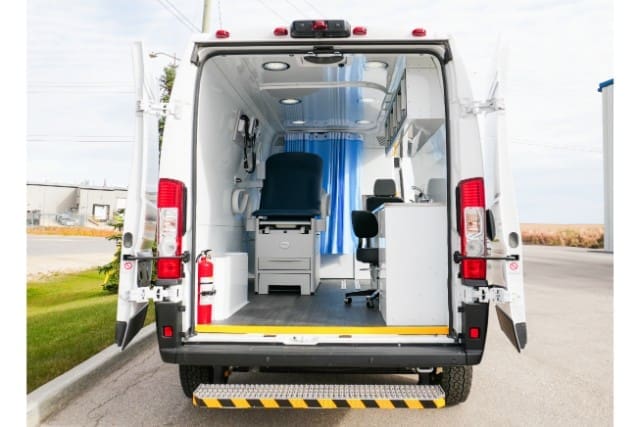
The average mobile medical clinic weighs between 6,500 and 7,500 pounds, but you might wonder why they have such a wide range.
It all comes down to customization. Every organization has different needs, and the equipment inside changes the overall weight. Some clinics have a basic setup for simple exams, while others carry specialized medical equipment, which adds more weight.
What causes the weight to change?
Here are a few reasons why no two mobile clinics weigh exactly the same:
Medical program scope: A clinic offering general checkups will likely weigh less than one equipped for something more specific, like mobile dialysis treatments or mobile OBGYN.
Optional features: Some organizations require extra built-in storage, seating, or equipment, while others keep things minimal.
The vehicle: Mobile medical units can come in all shapes and sizes. Many organizations prefer the van setup for added versatility, while others go with an RV.
If you’re planning a mobile health clinic, thinking about weight early on helps you build the right setup. It can affect how the van drives, fuel efficiency, and long-term maintenance.
Next, let’s take a look at some of the weights of common objects in mobile medical units.
How much do the most common objects in a mobile clinic weigh?
Now that we’ve covered how much a mobile medical clinic weighs overall, let’s break it down further. Every piece of equipment inside adds weight, but some things make a bigger difference than others. If you’re setting up a mobile health clinic, it helps to know exactly what you’re adding so you can keep things balanced and running smoothly.
Here’s a look at some of the most common objects found in a mobile medical clinic and why they matter.
Magnetic flip table – 11 lbs.
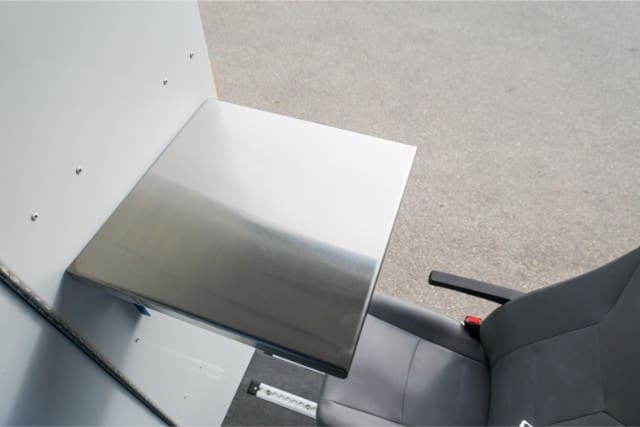
A magnetic flip table is one of those small but super useful pieces of equipment. It folds up when you don’t need it, making extra space inside the mobile clinic, and depending on the size and material, a 12×24” table weighs about 11 lbs.
Why it matters:
- Gives you a sturdy surface for medical tools, paperwork, or devices.
- Folds away to make the most of the space inside your mobile health clinic.
- Magnetic features help keep things from shifting while driving.
A flip table is a solid choice if you’re tight on space but still need a reliable workspace.
Sink and water system – 59 lbs. per tank
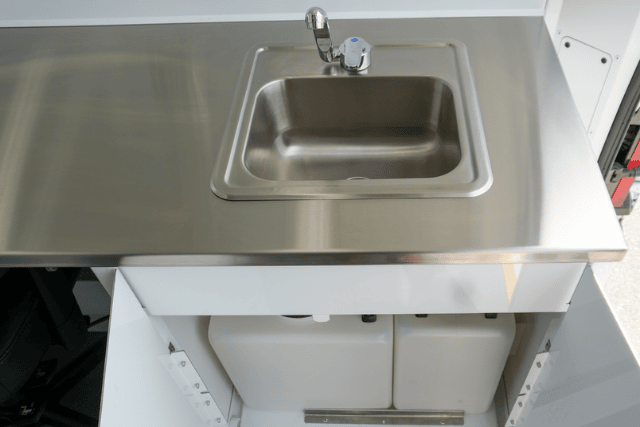
If you’re running a mobile medical clinic, you need a way to wash hands, clean tools, and handle basic sanitation. Most clinics have two tanks. One for fresh water and one for wastewater. When full, each 7-gallon tank weighs about 59 lbs.
Why it matters:
- Running water is a must-have for hygiene and safety.
- Helps keep your mobile health clinic up to medical standards.
- Waste tanks store used water until it can be properly disposed of.
Without a water system, keeping things clean inside a mobile clinic gets tricky fast.
AMF seats – 50.7 to 50.9 lbs.
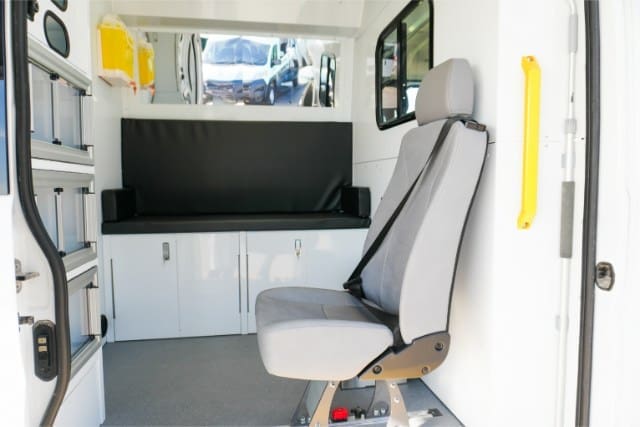
Seating in a mobile health clinic is about more than comfort. It’s about safety and efficiency. The AMF rolling seats weigh around 50.7 lbs., while the removable rear-facing attendant seats weigh about 50.9 lbs.
Why they matter:
- Rolling seats help caregivers move around easily while assisting patients.
- Attendant seats give staff a secure, comfortable place to sit while traveling.
- Designed to meet medical transport safety standards, keeping both staff and patients safe.
A well-planned seating layout greatly improves the function of a mobile medical clinic, helping caregivers work comfortably and efficiently.
Generator – 46.5 lbs. empty, 47.5 lbs. full
Power is a big deal in a mobile clinic, and a Honda 2200 generator is a common choice. It weighs 46.5 lbs when empty and about 47.5 lbs when full.
Why it matters:
- Provides reliable power for medical equipment, lights, and charging stations.
- Essential for off-grid clinics that operate in remote areas.
- Lightweight compared to other generators, making it easier to transport.
Without a generator, running a fully functional mobile health clinic in areas without direct power sources becomes a challenge.
Every object in a mobile clinic adds weight, but each one plays an important role in delivering quality healthcare on the go.
Learn more about mobile clinics
Maybe you landed on this article because you wanted to know how much a mobile clinic weighs. Or, maybe you were curious about the weights of specific items in a mobile clinic.
Here’s what you’ve learned:
- The average mobile clinic weighs 6,500 to 7,500 lbs., depending on customization.
- Key objects inside, like flip tables, sinks, AMF seats, and generators, each add weight and serve an important role.
- Understanding these weights helps you design a mobile medical clinic that’s balanced, efficient, and built for the long haul.
At AVAN Mobility, we know that weight plays a big role in how well your mobile clinic performs. It can affect how smoothly your van drives, how much wear and tear it takes over time, and even whether it requires a commercial license. For over a decade, we’ve helped organizations across the U.S. build mobile health clinics that work exactly as expected without surprises down the road. Whether you’re just getting started or refining your setup, we’re here to help.
If you have questions about building a mobile medical clinic, click the button below to talk to a mobility expert.
Not ready to chat yet? We have a few other resources you should check out to learn more about mobile clinics.
Start by checking out our five-part article series that will answer a lot of questions you have about mobile health clinics. Prefer to learn by watching instead? Check out these videos below:
FAQs about mobile clinic weight
Q: Does the weight of a mobile clinic affect fuel efficiency?
A: Yes. A heavier mobile clinic requires more fuel to move, which can impact operating costs over time. This is one of the reasons some organizations prefer a lighter-weight van over something like a mobile medical RV or bus.
Q: Do mobile clinics have weight limits they need to follow?
A: Yes, every mobile medical clinic must stay within the Gross Vehicle Weight Rating (GVWR), which is set by the vehicle manufacturer. Exceeding this weight can lead to safety risks, excessive wear and tear, and even legal restrictions.
Q: Do I need a commercial driver’s license (CDL) to operate a mobile clinic van?
A: No. The Mobile Clinics we manufacture at AVAN Mobility fall well below 26,000 lbs., meaning a CDL isn’t required to drive them. This makes it easier for organizations to operate their mobile health clinic without needing special licensing.
Q: Does adding more equipment mean I’ll need a bigger mobile clinic?
A: Not necessarily. It depends on the total weight and how efficiently the space is designed. A well-planned mobile medical clinic can fit everything you need without exceeding weight limits, but if you require heavy-duty medical equipment, a larger van might be the better choice.
